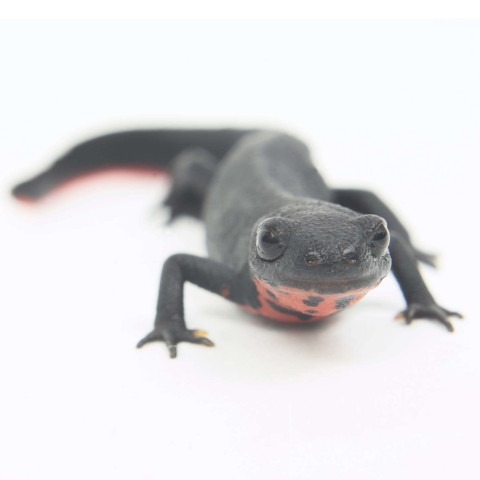
When a baby starts learning their native language, animal names are one of the first word categories their parents teach them. As a Thai learner, you’ll find it beneficial to learn the names of animals in Thai early on—this is a natural way to expand your vocabulary, and doing so will help you start conversations with native speakers. After all, who doesn’t love talking about their pets or favorite animals?
In this article, we’ll teach you the names of common animals in Thai. This includes:
- Pets
- Farm animals
- Wild animals
- Marine animals
- Bugs and insects
- Birds
- Reptiles and amphibians
In addition, we’ll teach you what to call the different body parts of animals and what sounds animals make according to Thai onomatopoeia. Make sure to stick around until the end, where we’ll introduce you to frequently used idioms that mention animals; this will help familiarize you with Thai culture and give you an idea of how these words might be used in a sentence.
Let’s get started!
 Table of Contents
Table of Contents
- Pets
- Farm Animals
- Wild Animals
- Marine Animals
- Bugs & Insects
- Birds
- Reptiles & Amphibians
- Animal Body Parts
- Animal Sounds in Thai
- Animal-Related Idioms in Thai
- Conclusion
1. Pets
The most popular pets among Thai people are dogs and cats, though some people own smaller mammals or even birds and fish. Here’s a list of common pets in Thailand:
- สุนัข (sù-nák) = “dog” (formal)
- หมา (mǎa) = “dog” (informal)
- แมว (maaeo) = “cat”
- กระต่าย (grà-dtàai) = “rabbit”
- แฮมสเตอร์ (haaem-sà-dtôoe) = “hamster”
- ปลาทอง (bplaa-thaawng) = “goldfish”
- นก (nók) = “bird”

Dogs are a popular pet in Thailand.
2. Farm Animals
Do you know which farm animals are most common in Thailand? Most of them are the same animals you’d expect to find on a farm in other countries. Take a look:
- โค (khoo) = “ox” / “cow” (formal)
- วัว (wuua) = “ox” / “cow” (informal)
- กระบือ (grà-buue) = “buffalo” (formal)
- ควาย (khwaai) = “buffalo” (informal)
- สุกร (sù-gaawn) = “pig” (formal)
- หมู (mǔu) = “pig” (informal)
- เป็ด (bpèt) = “duck”
- ไก่ (gài) = “chicken”
- ห่าน (hàan) = “goose”
- ม้า (máa) = “horse”
- ล่อ (lâaw) = “mule”
- ลา (laa) = “donkey”
3. Wild Animals
Below, you’ll find the names of different wild animals in the Thai language. Many of these animals can only be found in zoos and national parks, and some of them are currently endangered or extinct.
- สิงโต (sǐng-dtoo) = “lion”
- เสือโคร่ง (sǔuea-khrôong) = “tiger”
- เสือดาว (sǔuea-daao) = “leopard”
- จิ้งจอก (jîng-jàawk) = “fox”
- กวาง (gwaang) = “deer”
- ละมั่ง (lá-mâng) = “antelope” (endangered species)
- สมัน (sà-mǎn) = “Schomburgk’s deer” (deer with the most beautiful antlers in the world)
- เก้ง (gêeng) = “barking deer” (endangered species)
- แรด (râaet) = “rhinoceros”
- กระทิง (grà-thing) = “gaur”
- แกะ (gàe) = “sheep”
- แพะ (pháe) = “goat”
- ลิง (ling) = “monkey”
- ชะนี (chá-nii) = “gibbon”
- ลิงกอริลล่า (ling-gaaw-rín-lâa) = “gorilla”
- ลิงชิมแปนซี (ling-chim-bpaaen-sii) = “chimpanzee”
- ยีราฟ (yii-ráap) = “giraffe”
- จิงโจ้ (jing-jôo) = “kangaroo”
- ช้าง (cháang) = “elephant”
- แพนด้า (phaaen-dâa) = “panda”
- หมี (mhǐi) = “bear”
- หมีโคอาล่า (mhǐi-khoo-aa-lâa) = “koala”
- ฮิปโป (híp-bpoo) = “hippopotamus”

Let’s go see a tiger at the zoo!
4. Marine Animals
As with wild animals, Thai people most often get to see marine life in zoos or aquariums. Here are the names of common sea animals in the Thai language:
- สัตว์น้ำ (sàt-nám) = “aquatic animals”
- กุ้ง (gûng) = “shrimp”
- กั้ง (gâng) = “mantis shrimp”
- หอย (hǎauy) = “shellfish”
- ปู (bpuu) = “crab”
- ปลา (bplaa) = “fish”
- หมึก (mùek) = “squid” / “octopus”
- วาฬ (waan) = “whale”
- ฉลาม (chà-lǎam) = “shark”
- โลมา (loo-maa) = “dolphin”
- ม้าน้ำ (máa-nám) = “seahorse”
- เต่า (dtào) = “turtle”
- แมงกะพรุน (maaeng-gà-phrun) = “jellyfish”
- พะยูน (phá-yuun) = “sea cow”
- ม้าน้ำ (máa-nám) = “seal”
- ปลิงทะเล (bpling-thá-lee) = “sea cucumber”
- ดาวทะเล (daao-thá-lee) = “starfish”
- ปะการัง (bpà-gaa-rang) = “coral”

I saw a shark at the aquarium.
5. Bugs & Insects
In Thailand, it’s not uncommon to eat certain insects as food. Worms, grasshoppers, and crickets are especially popular!
Here are the names of common insects and other bugs in Thailand:
- แมลง (má-laaeng) = “insect”
- แมลงสาบ (má-laaeng-sàap) = “cockroach”
- แมลงวัน (má-laaeng-wan) = “fly”
- แมลงปอ (má-laaeng-bpaaw) = “dragonfly”
- แมลงเต่าทอง (má-laaeng-dtào-thaawng) = “ladybug”
- แมงมุม (maaeng-mum) = “spider”
- แมงป่อง (maaeng-bpàawng) = “scorpion”
- มด (mód) = “ant”
- ยุง (yung) = “mosquito”
- ผึ้ง (phûeng) = “bee”
- ต่อ (dtàaw) = “wasp”
- ตั๊กแตน (dták-gà-dtaaen) = “grasshopper”
- จั๊กจั่น (ják-gà-jàn) = “cicada”
- หิ่งห้อย (hìng-hâauy) = “firefly”
- หนอน (nǎawn) = “worm”
- ผีเสื้อ (phǐi-sûuea) = “butterfly”

These ladybugs are so cute.
6. Birds
Below, you’ll find the names of common birds in Thailand and abroad. While Thai people can encounter some of these species in their daily lives, others can only be seen in zoos.
- นกพิราบ (nók-phí-râap) = “pigeon”
- นกกระจอก (nók-grà-jàawk) = “sparrow”
- นกแก้ว (nók-gâaeo) = “parrot”
- นกกระจอกเทศ (nók-grà-jàawk-thêet) = “ostrich”
- นกยูง (nók-yuung) = “peacock”
- นกอินทรี (nók-in-sii) = “eagle”
- นกกะเรียน (nók-gà-riian) = “flamingo”
- นกฮูก (nók-hûuk) = “owl”
- นกนางนวล (nók-naang-nuan) = “seagull”
- หงส์ (hǒng) = “swan”
- แร้ง (ráaeng) = “griffon”
- อีกา (ii-gaa) = “crow”
- เหยี่ยว (yìiao) = “hawk”
- เพนกวิน (phen-gwîn) = “penguin”
7. Reptiles & Amphibians
In Thailand, there is a famous crocodile show held at the Samutprakarn Crocodile Farm and Zoo. If you plan on visiting the country anytime soon, make sure to check it out!
Here are the names of common reptiles and amphibians in Thailand:
- กบ (gòp) = “frog”
- เขียด (khìiat) = “green frog”
- อึ่งอ่าง (ùeng-àang) = “bullfrog”
- จระเข้ (jà-rá-khêe) = “crocodile”
- งู (nguu) = “snake”
- ตัวเงินตัวทอง (dtua-ngoen-dtua-thaawng) = “water monitor” (formal)
- เหี้ย (hîia) = “water monitor” (informal)
- กิ้งก่า (gîng-gàa) = “chameleon”
- จิ้งจก (jîng-jòk) = “lizard”
- ตุ๊กแก (dtúk-gaae) = “gecko”
- จิ้งเหลน (jîng-lěen) = “skink”
- อิกัวนา (i-gua-nâa) = “iguana”
- ตะขาบ (dtà-khàap) = “centipede”
- หอยทาก (hǎauy-thâak) = “snail”
- กิ้งกือ (gîng-guue) = “millipede”

I hate lizards.
8. Animal Body Parts
Now that you’ve learned the names of several animals in Thai, it’s time to learn what their body parts are called!
- จะงอยปาก (jà-ngaauy-bpàak) = “beak”
- ปีก (bpìik) = “wing”
- หาง (hǎang) = “tail”
- ขน (khǒn) = “feather”
- เขา (khǎo) = “horn” / “antler”
- งา (ngaa) = “ivory”
- นอ (naaw) = “rhinoceros’s horn”
- กระดอง (grà-daawng) = “shell”
- ครีบ (khrîip) = “fin”
- กรงเล็บ (grong-lép) = “claw”
9. Animal Sounds in Thai
In each country, people associate animals with different onomatopoeic sounds. If you live in the United States, for example, you likely say that dogs go “woof” and cats go “meow.” But do you know their sounds in Thai?
Notice that most of the sounds below are doubled, as this is how they’re represented in the Thai language.
- โฮ่ง ๆ (hôong-hôong) = dog’s sound
- เหมียว ๆ (mǐiao-mǐiao) = cat’s sound
- อู๊ด ๆ (úut-úut) = pig’s sound
- มอ ๆ (maaw-maaw) = ox’s sound
- ฮี่ ๆ (hîi-hîi) = horse’s sound
- เอ้กอีเอ้ก ๆ (êek-ii-êek-êek) = cock’s sound
- จิ๊บ ๆ (jíp-jíp) = bird’s sound
- ก้าบ ๆ (gâap-gâap) = duck’s sound
- เจี๊ยบ ๆ (jíiap-jíiap) = chick’s sound
- เจี๊ยก ๆ (jíiak-jíiak) = monkey’s sound
- แปร๋น ๆ (brǎaen-brǎaen) = elephant’s sound
- อ๊บ ๆ (óp-óp) = frog’s sound
10. Animal-Related Idioms in Thai
There are many idioms in Thai that mention animals. Learning them will give you a better idea of how we view animals in Thai culture, and using them yourself will help you sound more like a native speaker. Below, we’ve listed and explained the ten most common animal idioms.
1 – กระต่ายหมายจันทร์
Pronunciation: grà-dtàai mǎai jan
Literal translation: Rabbit wants the moon.
Idiom meaning: This idiom comes from a children’s story, and it refers to a man who loves a woman of higher social or financial status. It compares a man to a rabbit and a woman to the moon. Despite how much the rabbit wants the moon, it can do nothing but stare. There are two ways to use this idiom: to say that a man is like a rabbit or to compare a man’s actions to those of a rabbit.
Example:
เมฆชอบดาวมาก แต่เขาก็เป็นได้แค่กระต่ายหมายจันทร์
mêek-châawp-daao-mâak dtàae-khǎo-gâaw-bpen-dâi-khâae-grà-dtàai-mǎai-jan
“Mek likes Dow a lot, but there is nothing he can do (because Dow is richer or has a much higher social status).”
2 – หนูตกถังข้าวสาร
Pronunciation: nǔu-dtòk-thǎng-khâao-sǎan
Literal translation: A rat falls into a bucket of rice.
Idiom meaning: When a rat falls into a bucket of rice, it suddenly has a lot of food without needing to do anything. In the same way, a man who marries a richer woman gets more money without having to work for it. This idiom is typically used as an insult directed toward men who marry women of higher financial status.
Example:
วินแต่งงานกับคนรวย เลยถูกดูถูกว่าเป็นหนูตกถังข้าวสาร
win-dtàaeng-ngaan-gàp-khon-ruuay looei-thùuk-duu-thùuk-wâa-bpen-nǔu-dtòk-thǎng-khâao-sǎan
“Win married a rich woman, so others look down on him.”
3 – วัวแก่กินหญ้าอ่อน
Pronunciation: wuua-gàae-gin-yâa-àawn
Literal translation: Old ox eats young grass.
Idiom meaning: This idiom refers to a man who marries (or is in a relationship with) a much younger woman. The saying stems from the eating habits of oxen; young oxen only eat young grass, but old oxen can choose to eat either old or young grass. Older men who marry younger women are like an old ox that chooses to eat only young grass. We normally use this idiom in a negative way, as this type of relationship is quite improper in Thailand.
Example:
ลุงเป็นวัวแก่กินหญ้าอ่อน เมียของลุงอายุน้อยกว่าลุงตั้ง 15 ปี
lung-bpen-wuua-gàae-gin-yâa-àawn miia-khǎawng-lung-aa-yú-náauy-gwàa-lung-dtâng-sìp-hâa-bpii
“Uncle is in a relationship with a young woman. His wife is 15 years younger than him.”
4 – รีดเลือดกับปู
Pronunciation: rîit-lûueat-gàp-bpuu
Literal translation: Squeeze blood from crab
Idiom meaning: This idiom refers to a situation where someone tries to benefit or receive financial gain from those who have nothing to give. Crabs have little blood, so trying to get blood from them is next to impossible.
Example:
เขารู้ว่าคนที่เช่าที่เขาไม่มีเงิน แต่ก็จะขึ้นค่าเช่า รีดเลือดกับปูชัด ๆ
Khǎo-rúu-wâa-khon-thîi-châo-thîi-khǎo-mâi-mii-ngoen dtàae-gâaw-jà-khûen-khâa-châo rîit-lûueat-gàp-bpuu-chát-chát
“The landlord knows that his tenant has no money. Still, he increases the rent. He threatens to get benefits from those who have nothing to give.”
5 – ขี่ช้างจับตั๊กแตน
Pronunciation: khìi-cháang-jàp-dták-gà-dtaaen
Literal translation: Ride an elephant to catch grasshoppers
Idiom meaning: This Thai idiom refers to investing a lot only to get a little in return. Traditionally, elephants were used in big events such as war or long-distance travel; it wouldn’t make sense to use such a large animal for something small or insignificant (like catching grasshoppers). Likewise, one should not invest heavily in something that does not promise a high yield.
Example:
ถ้าจะเปิดร้านขายขนม แล้วต้องใช้เงินเยอะขนาดนี้ ดูยังไงก็ขี่ช้างจับตั๊กแตนนะ
thâa-jà-bpòoet-ráan-khǎai-khà-nǒm láaeo-dtâawng-chái-ngoen-yóe-khà-nàat-níi duu-yang-ngai-gâaw-khìi-cháang-jàp-dták-gà-dtaaen-ná
“If you invest this much money to open a bakery shop, it is like investing a lot to get a little in return.”
6 – นกน้อยทำรังแต่พอตัว
Pronunciation: nók-náauy-tham-rang-dtàae-phaaw-dtuua
Literal translation: Small bird builds its nest big enough for itself.
Idiom meaning: You should adjust your spending patterns based on how much money you have, and never buy what you can’t afford. Just like a bird can build its nest with the basic materials it finds, so can we build our homes and our lives with however much money we have.
Example:
แม่ว่ากระเป๋าใบนั้นราคาแพงไปหน่อยนะ นกน้อยต้องทำรังแต่พอตัวนะจ๊ะ
mâae-wâa-grà-bpǎo-bai-nán-raa-khaa-phaaeng-bpai-nàuuy-ná nók-náauy-dtâawng-tham-rang-dtàae-phaaw-dtuua-ná-já
(Mother talking to daughter) “I think that bag is too expensive. You should buy things based on the amount of money you have.”
7 – หมากัดอย่ากัดตอบ
Pronunciation: mǎa-gàt-yàa-gàt-dtàawp
Literal translation: Dog bites, don’t bite back.
Idiom meaning: This Thai proverb means that we should not lower ourselves to the level of those who hurt us or do bad things. In Thailand, we view those who do bad things or act inappropriately as lower-class people. By doing the same actions in order to get back at them, one is no better than they are. It’s okay to be angry, but we should never stoop down to their level.
Example:
ถึงเขาจะทำตัวหยาบคายใส่เรา แต่เราต้องไม่ทำแบบนั้น หมากัดอย่ากัดตอบ
thǔeng-khǎo-jà-tham-dtuua-yàap-khaai-sài-rao dtàae-rao-dtâawng-mâi-tham-bàaep-nán mǎa-gàt- yàa-gàt-dtàawp
“Although he acted rudely, we must not act rudely back. Don’t do bad things in order to get back at bad people.”
8 – จับปลาสองมือ
Pronunciation: jàp-bplaa-sǎawng-muue
Literal translation: Catch fish with two hands
Idiom meaning: This idiom refers to doing two difficult tasks at the same time, which will render your efforts unsuccessful. Think about trying to catch one fish in your right hand and another fish in your left hand at the same time; it would be very difficult! It’s better to do one thing at a time.
Example:
เธอจะขับรถหรือจะโทรศัพท์ ทำทีละอย่าง อย่าจับปลาสองมือ
thooe-jà-khàp-rót-rǔue-jà-thoo-rá-sàp tham-tii-lá-yàang yàa-jàp-bplaa-sǎawng-muue
“Are you going to drive or use your mobile phone? Do one thing at a time. Do not do two things at the same time.”
9 – ชี้โพรงให้กระรอก
Pronunciation: chíi-phroong-hâi-grà-râawk
Literal translation: Point to a hollow for a squirrel
Idiom meaning: This Thai proverb warns people to be careful when speaking, because our words can encourage others to do bad things (even if that was not our intention). For example, imagine that a woman is telling a friend that her window is broken and that she’s afraid a thief will come in that way. If someone in need of money happens to overhear, they may decide to break into that woman’s house to steal. A saying with a similar meaning in English might be, “Keep honest people honest.”
Example:
เธอพูดแบบนี้ ชี้โพรงให้กระรอกชัด ๆ
thooe-phûut-bàaep-níi chíi-proong-hâi-grà-râawk-chát-chát
“Your saying this is like encouraging someone to do a bad thing.”
10 – สอนจระเข้ให้ว่ายน้ำ
Pronunciation: sǎawn-jà-rá-khêe-hâi-wâi-nám
Literal translation: Teach a crocodile to swim
Idiom meaning: This idiom refers to teaching something to someone who can already do that thing well. Because crocodiles can already swim, there’s no need to teach them how.
Example:
เธอจะไปสอนแนนทำอาหารทำไม สอนจระเข้ให้ว่ายน้ำชัด ๆ
thooe-jà-bpai-sǎawn-naaen-tham-aa-hǎan-tham-mai sǎawn-jà-rá-khêe-hâi-wâi-nám-chát-chát
Why will you teach Nan how to cook? She already cooks well.

11. Conclusion
In this article, you learned several Thai animal names and some other relevant vocabulary. We also introduced you to the ten most common Thai idioms and proverbs that mention animals. It will take some time to memorize all of the words and phrases in this article, but you’re sure to get there if you practice often. Having these Thai words for animals up your sleeve will help you converse with native speakers about pets, favorite animals, and even nature in general!
If you would like to continue learning Thai in the fastest, easiest, and most fun way possible, make sure to create your free lifetime account on ThaiPod101.com today. We offer our students a variety of audio and video lessons, vocabulary lists, and other free resources to help them make the most of their study time.
Not sure where to start? We recommend you check out these fun articles:
Happy learning!










